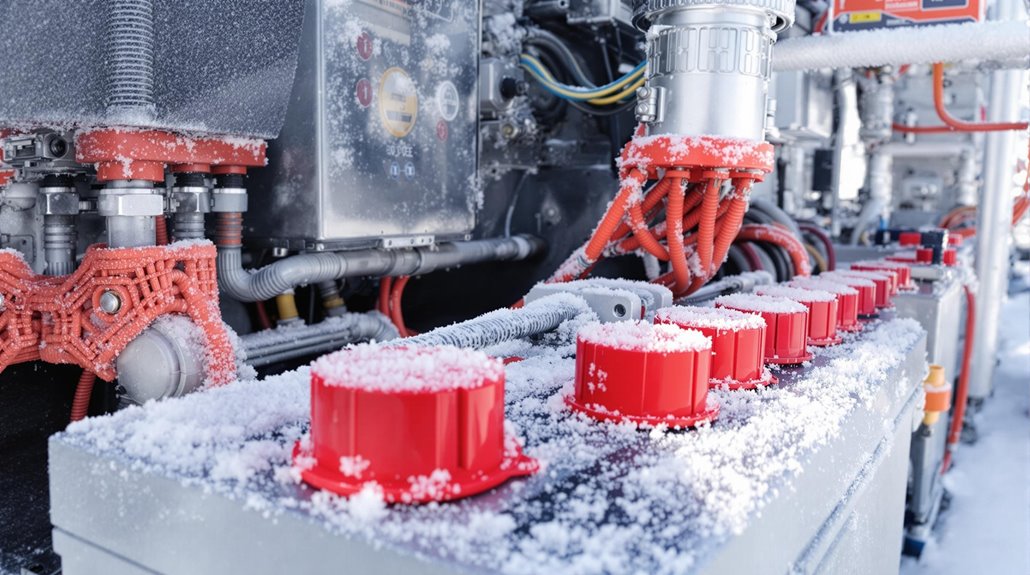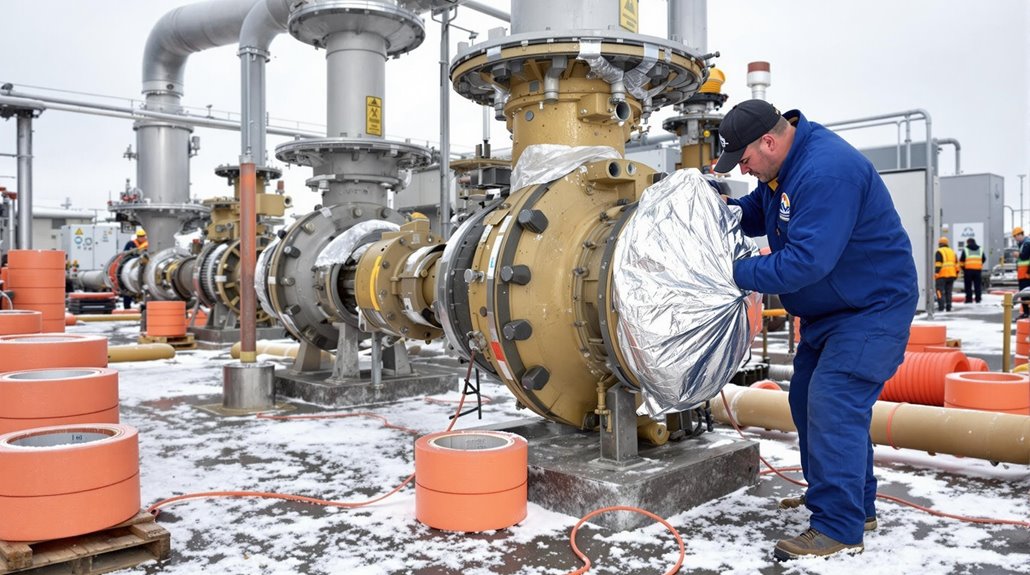You’ll protect your valuable industrial equipment from winter damage by implementing proper winterization procedures before cold weather strikes. Start by draining water systems, switching to winter-grade fluids, and inspecting all seals and insulation. Don’t forget to maintain batteries with regular checks and anti-corrosion treatments, while keeping emergency supplies ready. With thorough preparation, including staff training and detailed maintenance protocols, you’ll discover the key strategies for keeping your equipment running smoothly all winter long.
Common Cold Weather Challenges for Industrial Equipment

When winter arrives, industrial equipment faces several notable challenges that can impact both performance and safety.
You’ll need to watch out for frozen components in hydraulic systems, which can lead to costly equipment failures and unexpected downtime. Cold temperatures can also cause metal parts to contract, affecting precision tolerances and creating alignment issues.
Here are the main cold-weather challenges you’ll encounter:
- Battery performance drops notably
- Lubricants become thicker and less effective
- Rubber seals and gaskets become brittle
- Moisture accumulation leads to rust and corrosion
- Electrical systems experience increased resistance
- Fuel systems can develop condensation and gel
Understanding these challenges helps you take preventive action before small issues turn into major problems.
Regular monitoring and maintenance become even more critical during winter months.
Essential Winterization Steps for Machinery and Tools
To protect your industrial equipment from winter’s harsh effects, you’ll need to follow several critical winterization steps that prevent damage and maintain operational reliability.
Start by conducting thorough equipment inspections of all machinery, paying special attention to fluid levels, seals, and vulnerable components.
Your preventive maintenance checklist should include:
- Draining water from systems to prevent freezing
- Replacing standard fluids with winter-grade options
- Checking and upgrading insulation on pipes and equipment
- Testing heating systems and thermostats
- Inspecting and replacing worn weather stripping
- Lubricating all moving parts with cold-weather grease
- Cleaning and storing portable equipment indoors
- Installing thermal covers on exposed machinery
Remember to document all winterization procedures and maintain a regular inspection schedule throughout the cold season.
Fluid Management in Freezing Temperatures
Managing fluids properly in your industrial equipment becomes critical as temperatures drop below freezing. You’ll need to monitor fluid viscosity closely and take preventive measures to avoid system freeze issues that could damage your machinery.
| Fluid Type | Winter Management Tips |
|---|---|
| Hydraulic Oil | Switch to low-viscosity winter grade |
| Coolant | Maintain 50/50 antifreeze mixture |
| Fuel | Add anti-gel additives, keep tanks full |
| Lubricants | Use cold-weather synthetic options |
| Water Lines | Drain completely or add heat trace |
To protect your equipment, you’ll want to:
- Check fluid levels more frequently during cold spells
- Store sensitive fluids in temperature-controlled areas
- Install heating elements on critical fluid lines
- Monitor pressure gauges for signs of thickening fluids
- Keep spare winter-grade fluids on hand for emergencies
Battery Care and Electrical System Protection

Since cold weather can considerably impact electrical systems, proper battery maintenance becomes vital for keeping your industrial equipment running smoothly through winter.
You’ll need to regularly check your batteries’ charge levels and guarantee all electrical insulation is intact to prevent system failures during critical operations.
- Test battery capacity before winter sets in and replace any units showing signs of weakness
- Clean battery terminals and cable connections, applying anti-corrosion coating to prevent oxidation
- Inspect all electrical insulation for cracks or wear, replacing damaged sections immediately
- Store backup batteries in a temperature-controlled environment, keeping them at 40-60% charge
- Install battery warmers or insulation blankets if equipment must remain outdoors for extended periods
Proper Storage Techniques During Winter Months
When industrial equipment needs to be stored during winter, proper storage techniques can mean the difference between a smooth spring startup and costly repairs. Indoor storage is your best option, but if that’s not possible, you’ll need to use high-quality protective coverings designed for harsh weather. You should also elevate equipment off the ground using blocks or pallets to prevent moisture damage.
| Storage Type | Benefits | Considerations |
|---|---|---|
| Indoor Warehouse | Complete protection | Higher cost |
| Covered Shelter | Wind/rain protection | Partial exposure |
| Outdoor w/Covers | Flexible location | Regular inspection |
Remember to drain all fluids, remove batteries, and apply rust inhibitors before storage. It’s essential to maintain proper ventilation, even with protective coverings, to prevent moisture buildup and mold growth.
Emergency Preparedness for Cold Weather Events
Extreme cold weather events can strike suddenly, putting your industrial equipment and operations at serious risk.
You’ll need a thorough emergency plan that includes monitoring weather forecasts and maintaining essential emergency supplies. Having the right preparation can mean the difference between a minor disruption and a major shutdown.
- Keep a stock of emergency supplies, including fuel, antifreeze, and portable heaters
- Create an emergency contact list for repair services and key personnel
- Install temperature monitoring systems with automated alerts
- Develop clear procedures for emergency equipment shutdown
- Store critical spare parts on-site for quick repairs during winter storms
When you’re well-prepared for cold weather emergencies, you’ll minimize downtime and protect your valuable equipment.
Remember to regularly review and update your emergency procedures with your team.
Training Staff for Winter Equipment Maintenance

To guarantee your industrial equipment survives the winter, proper staff training becomes absolutely essential for maintenance success. You’ll need to schedule regular staff workshops that cover winterization procedures and maintenance guidelines for all your facility’s equipment.
| Training Component | Implementation Strategy |
|---|---|
| Safety Protocols | Weekly safety briefings |
| Equipment Checks | Hands-on demonstrations |
| Emergency Response | Mock scenario practice |
| Documentation | Digital tracking systems |
Make sure your team understands the importance of daily equipment inspections and knows how to spot early warning signs of cold-weather damage. You can reinforce this knowledge through practical exercises and real-time troubleshooting sessions. Create clear maintenance checklists that your staff can easily follow, and establish a reporting system for tracking winter-related equipment issues.
Cost-Effective Winter Protection Strategies
Implementing winter protection measures doesn’t have to strain your facility’s budget if you adopt smart, preventive solutions.
With careful budget considerations and strategic planning, you’ll find many cost-effective ways to protect your equipment from winter damage. Simple insulation materials, like thermal blankets and foam pipe covers, can provide excellent protection at a reasonable cost.
- Install foam pipe insulation sleeves, which are inexpensive and easy to apply without professional help.
- Use recycled or refurbished thermal blankets for large equipment coverage.
- Create windbreaks using existing structures or affordable temporary barriers.
- Schedule preventive maintenance during off-peak seasons when service rates are lower.
- Implement a rotating equipment usage schedule to reduce strain on individual machines during extreme weather.
These practical approaches help you maintain equipment integrity while keeping costs manageable throughout the winter season.
Conclusion
Just as a warm blanket protects you from winter’s chill, proper winterization shields your industrial equipment from costly damage. You’ll find that implementing these preventive measures is like building a fortress against the cold – protecting fluids, batteries, and essential components from freezing temperatures. By training your team and staying prepared, you’re not just maintaining machinery; you’re safeguarding your company’s lifeline through the harshest months.

